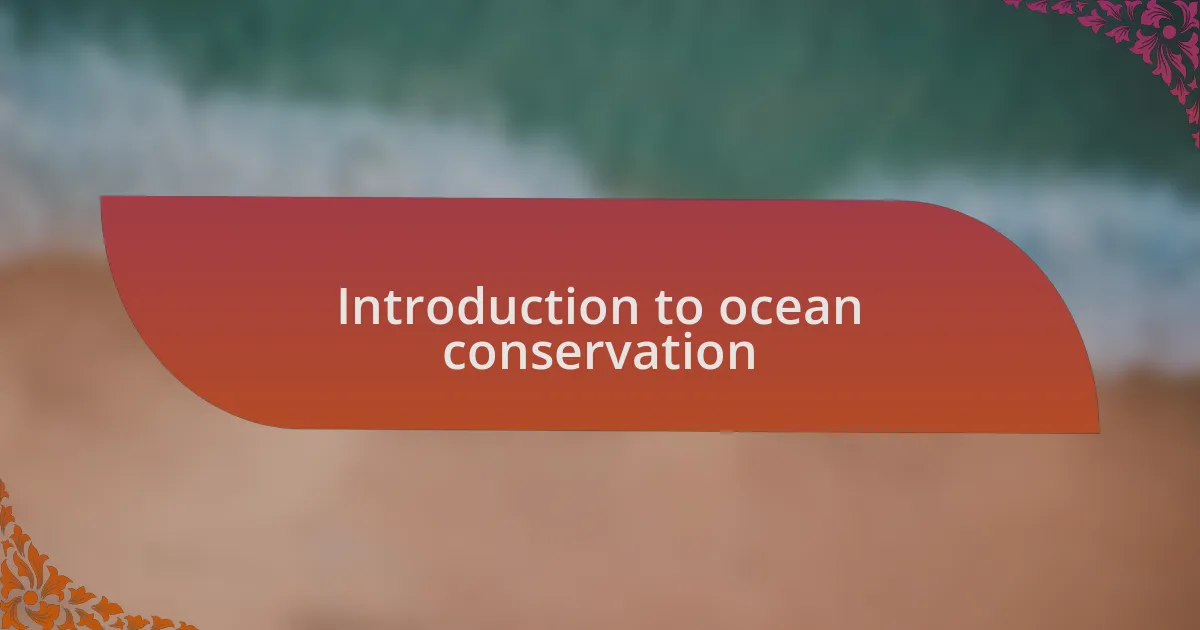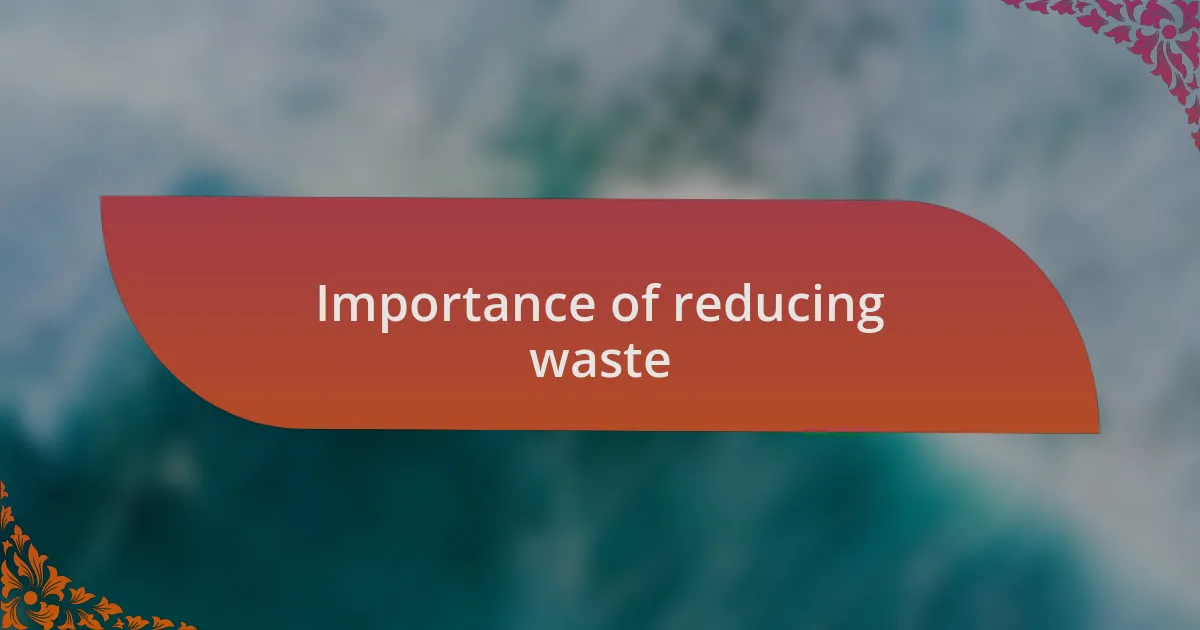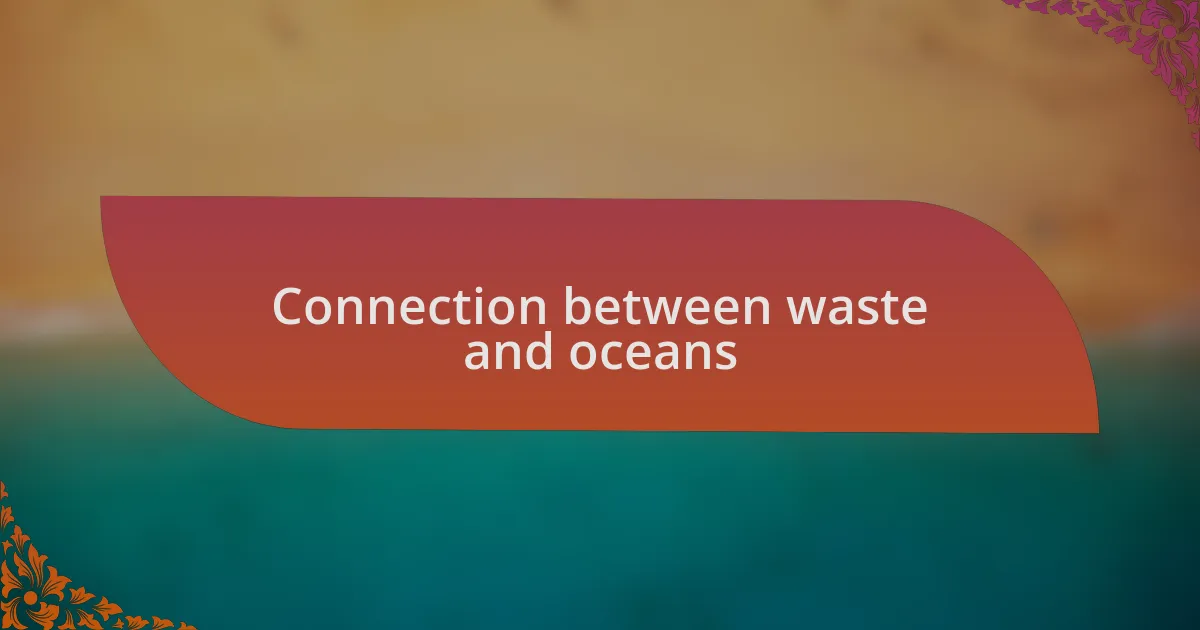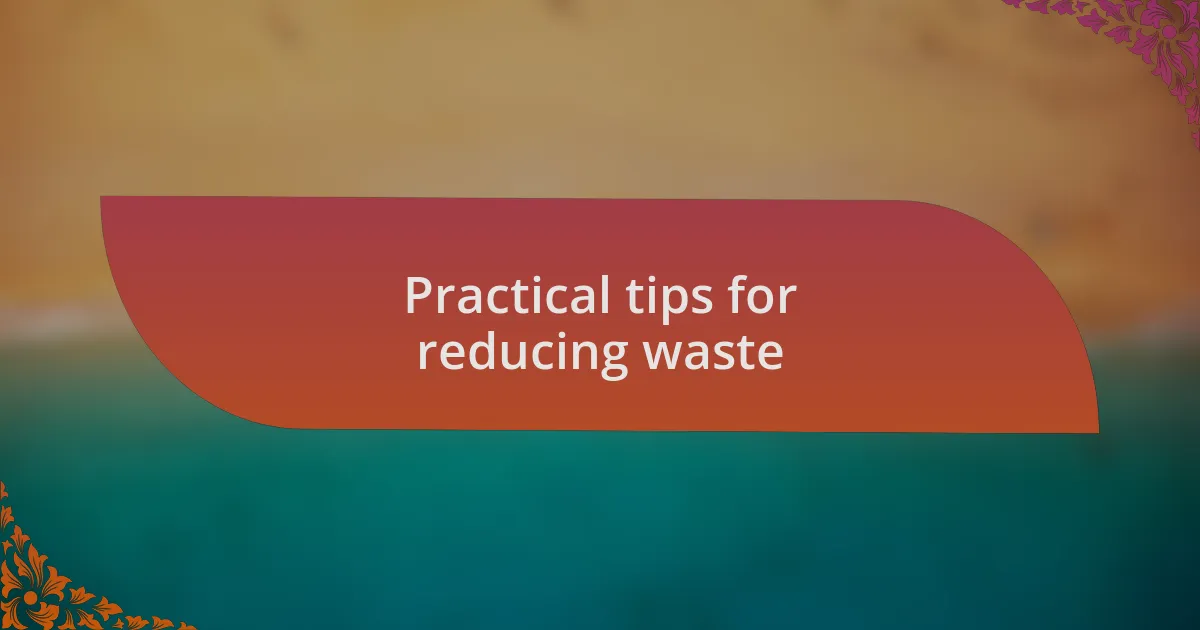Key takeaways:
- Ocean conservation is essential for protecting vital ecosystems, and individual actions, like reducing plastic waste, can significantly impact marine life.
- Reducing waste involves rethinking consumption habits, as every piece of trash can harm ocean health; collective efforts can create meaningful change.
- Experiencing the pollution in oceans firsthand can motivate personal commitments to zero waste and community engagement for cleaner waters.
- Practical steps like using reusable items, bulk shopping, and composting can help reduce waste and inspire others to adopt similar practices.

Introduction to ocean conservation
Ocean conservation is a crucial endeavor that aims to protect our planet’s most vital ecosystems. Every time I stand on the shore, listening to the waves, I’m reminded of the incredible life that thrives beneath the surface, yet I also feel the weight of its fragility. Have you ever considered how the smallest actions—like reducing plastic waste—can create ripples of change in these vast waters?
From my experience, the ocean is more than just a body of water; it’s a source of inspiration and wonder. I vividly recall a snorkeling trip where I swam alongside vibrant coral reefs, teeming with life. That moment solidified for me the importance of protecting these ecosystems, as they face threats from pollution, overfishing, and climate change. What can we do to ensure that future generations can experience the same awe?
As we delve into the world of ocean conservation, it’s essential to recognize that our actions have direct consequences on marine life. Each piece of litter we discard can become a trap for a sea turtle or a fish. In my opinion, this realization transforms how we view our relationship with the ocean. Are we stewards of the sea, or merely bystanders? The choice is ours, and it starts with understanding the impact of our daily habits.

Importance of reducing waste
Reducing waste is vital because every item we throw away can end up in our oceans, contributing to pollution that harms marine life. I remember a day when I picked up trash along the beach and stumbled upon a tangled plastic net. It hit me hard—this seemingly small piece of waste could entrap a dolphin or a bird. How can we expect to sustain healthy ocean ecosystems if we continue to underestimate the long-term effects of our everyday choices?
Waste reduction isn’t just about cleaning up; it’s about rethinking how we consume. I recently swapped single-use plastic for reusable options, and it felt empowering. Each small change builds a collective effort—what if millions of us adopted this mindset? I firmly believe that by consistently choosing to reduce waste, we can foster a culture of responsibility that honors the ocean and everything it sustains.
Ultimately, understanding the importance of reducing waste comes down to recognizing our role in the cycle of life. When I look at the ocean, I see both beauty and vulnerability. It reminds me that it’s our duty to cherish it through conscious living. Why not start today? Every small step we take brings us closer to a healthier planet and a more vibrant ocean.

Connection between waste and oceans
The link between waste and our oceans became painfully clear to me during a kayaking trip last summer. Paddling through calm waters, I encountered heaps of plastic debris caught in the tidal currents. It was unsettling to think about how something so convenient for us can transform into a death sentence for marine creatures. Isn’t it astonishing that our daily habits can have such a profound impact on these majestic ecosystems?
I’ve always marveled at the ocean’s vastness, yet seeing bottles and bags floating by felt like a betrayal of its beauty. It stirred a sense of urgency within me. Why do we allow our waste to dictate the health of our oceans? Each piece of trash carries a story—a discarded snack, an abandoned project, an oversight in our consumption patterns. Recognizing this connection has reshaped how I engage with my environment.
As I made a commitment to go zero waste, I began to notice the ripple effects on ocean health almost immediately. I started hosting community clean-ups and urging my friends to reflect on their waste habits. Witnessing the change in our collective attitude was inspiring; could we truly foster a movement that prioritizes our oceans over convenience? Engaging with this issue isn’t just an act of kindness; it’s a necessity for the sustenance of our planet’s precious waters.

Practical tips for reducing waste
One of the first steps I took on my journey to reduce waste was to swap single-use items for reusable alternatives. For instance, I began carrying a stainless steel water bottle wherever I go, which not only helps minimize plastic but also keeps my water cool on hot days. Have you ever thought about how many bottles you’ve tossed out? It’s eye-opening when you realize that making small changes can lead to significant reductions in waste.
Embracing bulk shopping was another game-changer for me. Instead of reaching for pre-packaged snacks, I now bring my own containers to fill with nuts, grains, and dried fruits. The process feels almost meditative as I carefully select items, and I find it empowering to know that I’m avoiding excess packaging. It’s a simple act, but it makes me wonder—what other changes can we implement to combat the waste crisis we face?
I also delved into composting, transforming food scraps into nutrient-rich soil for my garden. It was surprisingly fulfilling to witness the cycle of waste becoming something beautiful and useful. Have you ever tried composting? It amazed me to see how much I could divert from the landfill. By incorporating these practices, I not only reduce my own footprint but also inspire others to rethink their habits. Every little change counts, doesn’t it?